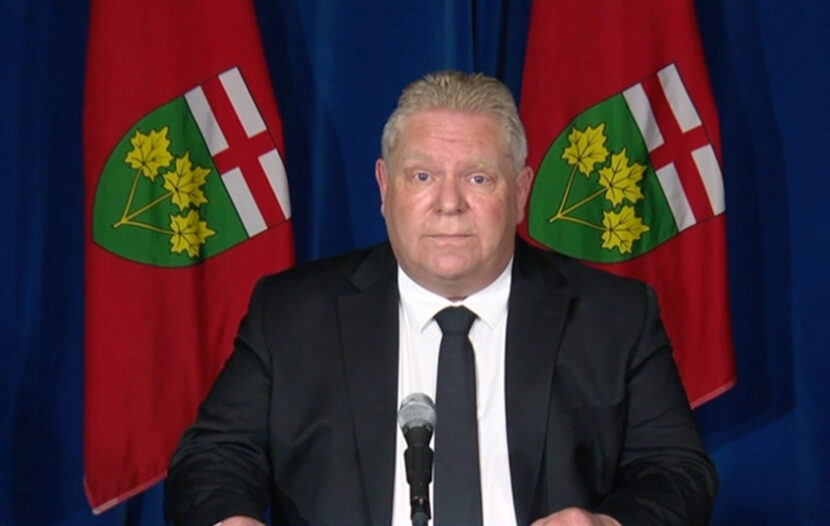TORONTO — New restrictions announced April 16 by Ontario Premier Doug Ford include restrictions on inter-provincial travel, as the province deals with rising COVID-19 caseloads fuelled by the variants of concern.
Ford said he’s extending Ontario’s stay-at-home order by two weeks, for a total of six weeks.
In a move that took effect at 12:01 a.m. Monday, April 19, there will be checkpoints at all of Ontario’s inter-provincial borders. “We will be limiting access at Ontario’s borders with Manitoba and Quebec,” he said. Access will be limited to essential travel only, including essential workers and anyone traveling for medical care, transportation of goods, and exercising Indigenous treaty rights.
People without a valid reason for entering Ontario “will be turned back”.
Ford said he’s also calling on the federal government to “tighten up our international borders.”
That means further limiting air travel into Ontario, tightening the Canada – U.S. border, and addressing issues with people coming into Ontario and not doing the mandatory hotel quarantine and / or home quarantines, he said.
“More than 36,000 people per week are coming through Pearson Airport,” said Ford. “These COVID-19 variants aren’t swimming across the ocean. They’re being brought in. They got in through our borders.”
“We’re locking down Ontario’s borders for the first time in recent memory,” he said.
Vaccine supply has slowed down, frustrating Ontario’s efforts to keep up with vaccination timelines. “We’re losing the battle between the vaccines and the variants,” he said.
“We’re down, but by no means are we out,” he added.
During the Q&A session, a reporter noted that no doubt more passengers are flying into Ontario from other provinces, than driving in.
“I agree with you 100%,” Ford responded. Ontario is controlling what it can control, he added: “Air travel is under federal jurisdiction.”
There were calls from other officials at today’s briefing to do COVID-19 testing on domestic arrivals at Ontario’s airports too, not just international travellers. “We have to lock it down,” said Ford.
OTHER PROVINCES EYEING INTER-PROVINCIAL TRAVEL RESTRICTIONS
Ontario’s new restrictions come as the province fights the third wave of COVID-19, fuelled by the variants of concern.
Other premiers looking at restricting inter-provincial travel include B.C. Premier John Horgan. On Tuesday Horgan said B.C. was considering travel restrictions amid rising COVID-19 numbers.
On April 14, Prime Minister Justin Trudeau said the federal government won’t push back if provinces or territories move to restrict travel as the third wave of COVID-19, fuelled by the variants, spreads across more of Canada.
Asked about restrictions on travel within Canada, Trudeau told the CBC: “Every step of the way, I’ve been supporting premiers and territorial leaders on what they need to do to keep people safe. As we saw with the Atlantic bubble, as we saw with the Arctic territories, they make decisions around closing off the regions. That is something that we are supportive of.”
Horgan has said B.C.’s measures could include examining the status of visitor bookings for hotels, bed and breakfasts and campsites.
Horgan said he and Alberta Premier Jason Kenney have spoken about issues regarding travel between the provinces and the potential impacts on COVID-19 case counts.
“Among those were the concerns we both share, mutually, about people that come back and forth between Alberta and B.C. whether it be on essential travel or non-essential travel and the consequences that’s having on case counts in our respective jurisdictions,” Horgan said.
Earlier this year, Horgan ruled out interprovincial travel restrictions, saying a legal review found B.C. doesn’t have the power to prevent outsiders from visiting.
But Horgan suggested on April 12 that the issue could be revisited.
“We’re listening to advice from public health officials. We’re taking that advice,” he said. “We’re following the science and if Dr. Henry believes that there’s an opportunity for us to use some form of border restrictions, we’ll look at that.’’
With file from The Canadian Press

